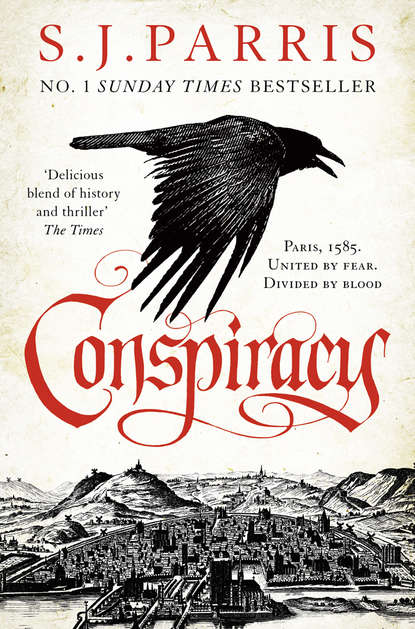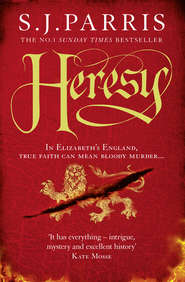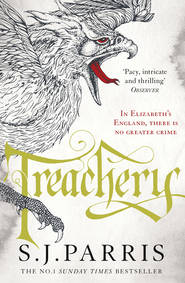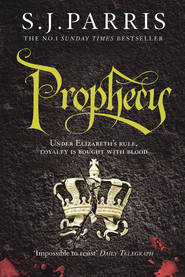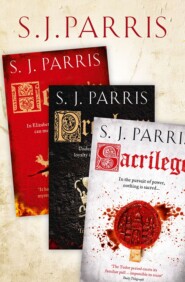По всем вопросам обращайтесь на: info@litportal.ru
(©) 2003-2024.
✖
Conspiracy
Автор
Год написания книги
2019
Настройки чтения
Размер шрифта
Высота строк
Поля
The gutters along each side of the rue du Cimetière already trickled steadily with the run-off from the roofs, though the rain remained thin and half-hearted. I tilted my head back to look up at the strip of sky between the crooked eaves of houses that leaned in toward one another across the narrow street, like drunks about to fall into each other’s arms. Paris was decaying; the years of religious strife had left no money for the upkeep of the streets, where refuse, ashes and shit of every kind banked up around potholes deep enough to break the legs of horses, while the fabric of the crowded medieval quartiers crumbled around their tenants, who had long ago resigned themselves to cold and foul smells and the ever-present threat of plague. It was a depressing place to take lodgings, inhabited almost entirely by the poorer students from the nearby Sorbonne and the Collège de France, but I had little choice since my return from London unless King Henri was willing to take me back under his patronage, and with France on the brink of civil war, it seemed he had more pressing matters on his mind than the circumstances of one exiled Italian heretic he had once called a friend.
Hunger, and the desire to delay the gloomy prospect of returning to my rooms alone, drove me to the Swan and Cross at the end of the street, a noisy, amiable tavern where groups of students gathered after the day’s lectures to argue philosophy and politics over a jug of cheap wine and exchange flirtatious insults with the working girls they could not afford. The air inside was thick with a fug of wet wool, roasting meat, tobacco and male sweat, but I was glad of the warmth. I turned at the sound of a whistle, to see a round-faced, cheerful whore I vaguely recognised by sight, perched sideways on a boy’s lap and winking at me while he chatted to his friends as if he had not noticed her.
‘Is it my lucky night tonight, Doctor? You look wet through. Let me warm you up.’
I offered a mock bow. ‘Forgive me, mademoiselle, but I’m afraid I’m not stopping.’
She pouted her rouged lips and squeezed her arms together to push up her breasts so that they threatened to spill over her tight bodice. ‘You always say that.’
‘Because I am always busy. Besides, you have company.’
‘Pfft.’ She waved a hand over the boy’s head. ‘Can’t be good for you. A man needs pleasure in his life, Doctor. Too much of this—’ she tapped the side of her head – ‘and not enough of this—’ she grabbed at her crotch, an exaggerated, masculine gesture. ‘Makes you ill. That’s why you’re getting thin.’
‘You could be right,’ I said, almost smiling as I edged by. ‘Maybe next time.’
She slapped me on the backside as I passed. ‘Well, I won’t wait around for ever. Carpe diem, Doctor.’
I raised an eyebrow and she grinned.
‘I see you’ve got some Latin out of these students.’
‘That’s about all I get out of them and their moth-eaten purses, stingy little ballsacks.’ She leaned over the shoulder of the boy she was sitting on and drank deep from his beaker of wine; I took advantage of the outcry to slip through the crowd. I could not afford the girls either, though they did not know this; they looked at me and saw well-cut clothes – good leather boots, black wool breeches and a short doublet of black leather with puffed shoulders, tailored in London in the days when I had a little money to spare, and carefully mended since – assumed an income to match and badgered me accordingly. Not that I was tempted by this one or any of her colleagues; still, I found her diagnosis depressingly accurate.
Gaston, the square-shouldered proprietor, appeared out of the fray as he always did, with the lock-jawed expression of a pikeman facing down a foe. When he caught sight of me, he elbowed his way through his customers without ceremony, wiping his hands on his apron and holding them out as if I were a nephew returned from a distant war. I submitted to his embrace as he wrapped me in his familiar smell of garlic and cooking fat.
‘Gaston,’ I said, finally disentangling myself, ‘do you remember a young theologian called Paul Lefèvre, used to come in here three years back when he was at the Sorbonne? Skinny fellow, reedy voice.’
Gaston squeezed his eyes shut and cocked his head to one side, as if listening for the answer. ‘That was the lad who went to be priest at Saint-Séverin, no? Adam’s apple like a snake swallowing a rat?’ He tugged the flesh of his neck out to illustrate the point.
‘That’s him. He used to take rooms on the rue Macon – do you know if he still had them?’
‘Had?’ His eyebrow shot up; no sharper eyes or ears on the Left Bank than Gaston’s, so they said. ‘Why, what’s happened to him?’
‘I mean – since I’ve been away,’ I corrected, quickly. I needed to act before Paul’s murder became common knowledge. ‘Was he still living there?’
He shrugged. ‘Far as I know. We haven’t seen him here for a long time – too holy for the likes of us now.’ He gave a throaty chuckle. ‘I remember him all right – used to sit there on the edge of the group as if he wanted the courage to throw himself into the conversation. Everyone always talked over him. You know he joined the League? Maybe he got more respect from them.’ He sucked in his fleshy cheeks to show what he thought of that. ‘He stopped coming in here after he was ordained priest – this would be after you’d gone to England, Signor Bruno. Turned into quite the hellfire preacher, you know, inflaming his congregation against the King and his appointed heir. Me and the wife changed church because of it, must have been a year back. I don’t go to Mass for a bellyful of politics. Mind you—’ he paused to draw breath, raising a forefinger like a schoolmaster – ‘I’m not saying I’d be happy to see some whoreson Protestant wearing the crown of France, but you have to respect—’
‘Thanks, Gaston. I have to go now,’ I said, patting him on the chest as I turned for the door.
‘Got any money for me?’ He made it sound good-humoured, but I was stung by guilt; he had given me too many suppers on credit lately, and the bill was mounting.
‘I will have it for you very soon, I swear. I just need to – get my affairs in order. Any day now.’ By which I meant, whenever the King deigns to send for me.
‘Ah, I’m only messing, lad – go on, what’ll you have? Put some meat on your bones. You look hungry.’
‘Thank you – perhaps later.’
‘You say that to all the girls,’ he called after me as I ducked between wildly gesturing students to escape, smiling to myself at the way he still thought of me as one of his boys, though at thirty-seven I was probably only a few years behind him. At least the whores and publicans of Paris were pleased to see me back.
The buildings took on a greyish pallor in the deepening shadows as the rain fell harder. The days were shortening towards midwinter; when the sky was overcast it felt as if night was falling by early afternoon. I wrapped my cloak around my shoulders and pulled the hood close to hide my face as I trudged back towards the river through rutted streets ankle-deep in filth. At the corner of rue Saint-Jacques, I felt a hand reach out and clutch at my sleeve; I whipped around, dagger half-drawn, but it was only a beggar-child, filthy and hollow-cheeked, with staring eyes. I would have thrown him a coin, but he caught sight of the knife and streaked away into an impossible gap between two houses quick as a fish. Paris was full of the dispossessed now; that was another change for the worse. Failing harvests and the constant three-way skirmishes between the Protestant Huguenot forces, the beleaguered royal armies and the swelling numbers of Catholic League troops further south had driven bedraggled flocks of refugees towards the capital, where they begged, stole, sold themselves, or starved to death on the streets.
It was growing harder to resist the melancholy that had crept over me since my enforced return from London. In Paris, as the chill and dark of autumn edged towards winter, I had begun to experience a gnawing homesickness for the blue skies and green slopes of my native Nola, at the foot of Mount Vesuvius, made keener by the knowledge that I might never return. For perhaps the first time since I had abandoned the religious life nine years ago, I was truly coming to understand what exile meant. This rootlessness – living out of a travelling bag, arriving in every town with one eye on the road out – no longer felt like freedom. Now, more than ever, it felt like the reverse. I had thought, for a while, that I might come to call London home, but that did not work out as I had hoped. I had left behind the few people I thought of as friends, and arrived in Paris to find those who had once opened their doors to me turning away, embarrassed. My reputation was becoming a problem, one I entrenched further with each new book I wilfully published. Though every fibre of my being bridled at the forced humiliation, I had no choice but to beg to have this excommunication lifted. At twenty-eight, I had worn it as the proud badge of a free-thinker. Now, at thirty-seven, I was obliged to view it in a different light: as an impediment to any offer of patronage. A man like me could not live without a patron, and no Catholic with a care for his honour will sponsor a known heretic; it was for this alone that I had approached Paul. For now, I belonged nowhere, and it was hard to shake that sense of exclusion.
I clenched my teeth and sheathed my dagger: no more of that. Courage, Bruno, I told myself, as I walked on towards the rue Macon. You have been in worse straits than this and talked your way out and up; you can do so again. I needed to see Jacopo Corbinelli. But first, I had to make sure I could not be further connected with Paul Lefèvre. If he had been carrying letters, they must have been taken from him before he was thrown in the river, but his lodgings would certainly be searched; if there was any correspondence that mentioned me or the favour I had asked of him, I wanted to be the one to find it. I knew too well how it might be used against me. There were those among the extreme Catholic faction here in Paris who knew, or guessed at, my activities in England. If they thought I desired the Church’s goodwill again, they would not miss the chance to use it as leverage. Reconciliation in exchange for information – and that was a bargain I was not prepared to strike. I still felt some loyalty to England, even if she appeared to have forgotten me. Beyond that, I had no intention of involving myself in Paul’s murder. We had been acquaintances, not friends; I was sorry that he had met such a brutal death, but he would have known he was courting danger when he decided to tangle with religious politics. Besides, I had a good idea that the cynical Frère Albaric had not been far wrong in his surmise about the Louvre, and that was a truth I preferred to leave for others to uncover.
Halfway along rue Macon I met a young woman with a basket of laundry sheltering in a doorway; after we had exchanged complaints about the weather, she confirmed that Père Lefèvre did indeed have rooms in a house opposite, on the first floor. I considered knocking to see if one of his neighbours would let me in, but there were no lights visible in the rest of the house, and it seemed wise to keep my visit discreet. A little careful tinkering with the blade of my knife, and the cheap lock of the front door yielded without much resistance. I latched it behind me, so that I would at least have some warning if someone else had the same idea.
It took a moment for my eyes to adjust to the gloom of the entrance hall, and I wished I had thought to bring a tinder-box and taper. On my left, a crooked staircase ran up to the first floor; after listening for any tell-tale sound of movement from other rooms, I climbed as carefully as I could, though it was impossible to stop the old boards from groaning in protest. My stomach let out a low growl and I clamped a hand across it as if that might muffle the sound; I regretted turning down Gaston’s offer of supper. The door to Paul’s rooms was also locked, and took longer to tease into compliance; this lock appeared newly fitted, and was of a more sturdy and sophisticated type than the rusted bolt downstairs. Had he installed it out of fear for his own safety, I wondered, or to protect some item of value inside? My fingers had grown stiff with cold; I breathed on them and reminded myself to be patient – a steady hand was vital in the series of minute movements required to persuade a lock to yield without a key. Too much haste and you would break the mechanism or slice your fingers. A strange skill for a philosopher, my friend Philip Sidney used to say, though always in a tone of admiration – but then Sidney found it hard to imagine the life I had led before I met him. As the son of a noble family, he had been taught to duel as a boy by a celebrated fencing master; I had learned to fight with my fists on the streets of Naples. I picked up additional skills not usually taught to Dominican friars during the two years I spent on the road north through Italy after I abandoned my order: passing nights in barns, or in taverns where men will put a knife in your ribs for a heel of bread, you learn to shift for yourself however you can. My fellow travellers in those years were not aristocrats and poets but criminals, charlatans and itinerants: strolling players, card sharps, defrocked priests, pedlars, jongleurs, whores and heretics. They knew a few tricks about how to survive, and were generous enough to pass them on. I thanked them silently as the lock finally submitted to the point of my knife with a gratifying click.
Paul had liked his surroundings austere; I almost smiled at the painstaking self-denial in evidence as I closed the door behind me. The room smelled of woodsmoke, damp and that stale odour of unwashed clothes that often clings to bachelors. I felt a stab of pity for him; he had allowed himself so little joy in his determination to please God, and look what it had brought him. Perhaps that was the saddest aspect of his death; he had never been a man who cared much for worldly advancement. If he had joined the Catholic League – those hardline religious conservatives determined to restore the purity of the Church, at any cost – it would have been from a genuine zeal to purge France of all that was unholy. Mind you, that was what the Inquisition in my country liked to claim too.
The main room contained only a wide desk under the window and a carved chest, of the kind used to store linen, in the opposite corner. The desk held an inkhorn, a pot containing three quills, a block of sealing wax and a small penknife; to the left of the inkhorn sat a rectangular wooden box, about a foot and a half long and half as much wide, its surface inlaid with intricate patterns in mother-of-pearl and ivory and fastened with a padlock. A mournful Virgin holding an infant with the face of an irascible old man hung on the wall opposite the window. The adjoining room was partitioned off by a curtain, which I drew back to reveal a space that hardly deserved to be called a bedchamber; more an alcove barely wide enough to hold a single bed. There was another, smaller casement here; I peered out to see that it opened on to the yard side of the house, where part of the ground floor jutted out in a sloping roof directly below the window. Above the bed Paul had fixed a heavy crucifix, with a tortured Christ gazing reproachfully, his neck twisted down to one side so that, if you were supine with your head on the pillow, his wounded eyes would stare right into you. Dio porco; imagine waking to that sight every morning. I knelt to look under the bed; at first I could only make out a chamber pot and some unidentified shape among drifts of dust. I stretched in, groping towards it until my fingers touched the edge of a wooden casket. I drew it out to find it was secured with a sturdy iron padlock. The keyhole was too small to accommodate the blade of my knife; I cast around the room in search of an alternative, but the best I could do was a poker in the fireplace, with which I forced the padlock until it snapped open and a collection of small items wrapped in cloth tumbled out on to the boards. I picked one up, intrigued; it was tied around with twine and gave off a faint odour of decay and alcohol. I unwrapped the bindings and dropped the object immediately, smothering a cry of disgust as I realised I was looking at a severed human finger, seemingly pickled to preserve it, though with dubious success. The flesh was blackened, the torn end of bone and sinew ragged and stringy. Why had Paul hidden such a thing? I tried to refold it in its cloth wrapping when I noticed a tiny paper label attached to the string. It read ‘A. Briant’. The name sounded familiar; I searched the index of my memory as I replaced it in the box and picked up another bundle. This one rattled lightly; scrawled on its label was the name ‘E. Campion’. Already guessing what I would find, I untied it gingerly and tipped the contents into my palm, wincing as I looked at a handful of bloody teeth. The name Campion had sprung the lock of my memory; Father Edmund Campion had been a Jesuit missionary to England, caught and executed for treason four years ago by Queen Elizabeth’s government. Alexander Briant was one of the missionary priests executed with him. It seemed Paul had been collecting relics of English martyrs, items highly prized by the English Catholic exiles in Paris, though the trade was illegal. I wrapped the teeth again, intending to push the whole grisly box back where I had found it, when the label of another packet caught my eye. I lifted it and read ‘J. Gifford’. My stomach clenched as I untied the string holding it; the cloth weighed almost nothing. Inside was a lock of blond hair, matted with dried blood. I had known an English priest by the name of Gifford once; I had watched him die. It seemed a lifetime ago. The bloodied hair lay in the palm of my hand like a reproach, or a warning. I shivered. Whatever Paul was involved in was not my business; I needed to find what I came for and get as far away as possible. I had been too close to too many deaths, these past few years. I shoved the box back into the shadows under the bed and turned my attention to the desk.
The padlock on the ornamental casket proved easy enough to force; the lid opened to reveal a pile of papers, as I had supposed. I took out the first sheet; it was folded in half to make a pamphlet, and on the front was handwritten ‘THE KING OF SODOM’ in strident capitals. Beneath this headline was a crude sketch of a crowned and bearded figure bent double and wearing women’s clothes, which he had hitched up to his waist to allow another man to take him from behind while wielding a flagellant’s whip. I opened the paper; inside was a polemic against the licentiousness of the court, explaining in lurid detail that King Henri III of France could not get an heir because he wouldn’t take his prick out of the Duke d’Epernon’s arse for long enough. I turned the paper back to look at the drawing. I recognised the style, but the version I had seen before was typeset and printed with a woodcut; one of the many anonymous handbills sold for a sou, thrust at you in the square outside Notre Dame by men who took care to keep their faces covered. You could find these pamphlets, discarded, blowing along the gutter near the colleges on the Left Bank. Even a cursory glance at this draft was enough to see that the author had conflicted feelings about the acts he described with such pious outrage; he had worked himself into such a pitch of righteous fury that in places his pen had scored right through the paper, yet it was impossible to disguise the relish in his lingering and explicit account of what the King and his mignons – those louche young nobles who hung about the court to fawn on him – were supposed to get up to in the royal bedchamber. Poor Paul, I thought again, if this were his work.
I lifted out the next paper to find another handwritten draft. The headline on the cover of this one ran: ‘An Account of the Most Glorious Achievements and Military Successes of Our Great King Henri III’. Inside, the page was left blank, except for one word in minute letters at the bottom: Rien. I had to bite back a laugh; it seemed Paul had possessed a sense of humour after all. This one would have wounded the King far more than any number of drawings of him being mounted by his friends; he had always enjoyed courting notoriety but he could not bear to be thought a failure. It did not surprise me to find that Paul had been providing the copy for inflammatory handbills, given his affiliation with the Catholic League – though I had to wonder why he had kept these incriminating drafts, knowing that the punishment for printing or distributing such libel against the King was execution. I replaced the papers in the box. Perhaps that was exactly what had happened, but without the courtesy of a trial.
A sound from below – a shout, a door slamming – jolted me from my thoughts. I paused, straining to hear, right hand moving instinctively towards my dagger, until I was satisfied that the sound had come from outside. I moved to the window and peered down, keeping to one side so that I would not be seen, but the street appeared to be empty. Again, I caught a faint smell of woodsmoke and glanced across to the small hearth opposite, where the remnants of a meagre fire lay cold in the grate. Paul had not given any indication during our brief conversation in the confessional that he believed himself to be in danger. Rather, he had spoken with the self-congratulating assurance of someone who considered himself favoured by the rising power. He had even hinted that the King was soon to fall. I wondered if he had had time to recognise his assailant before the blow struck, and whether the killer had waited around to see the bargemen pull him out of the water, or knew that he had been taken to the abbey. It would not take long before my presence at his deathbed leaked out; if that became known to whoever had wanted him dead, that person may fear I knew more than I should.
I picked up the poker and prodded the pile of ashes in the fireplace, jumping back as a sudden shower of sparks burst forth from a smouldering ember. The room was cold, yet it seemed Paul had lit a fire here recently; so small, to judge by the remnants, that it hardly seemed worth the trouble for the warmth it would offer. Two or more hours must have passed since the bargemen had brought him to the abbey; perhaps three, then, since he closed the door to these rooms for the final time, leaving the embers to burn themselves out. I crouched and poked further among the ashes, my pulse quickening as I uncovered a few blackened scraps, curling like charred leaves. So he had been burning papers. I hardly dared hope that anything legible might have survived, but I combed further through the cinders and at the very back of the hearth, where a draught must have blown it out of the flames’ reach, I spotted a fragment that still showed patches of discoloured writing.
I drew it out and held it between thumb and forefinger, the edges falling away to dust as I lifted it closer to my face, barely breathing lest it disintegrate. Only a few words remained visible between the scorch marks, written in a strong, flowing hand. ‘… to violate the sanctity of the confessional’, read one line, the remainder of the sentence blackened beyond recognition. ‘… wrestled with my conscience …’ was visible in the line below. Followed by this: ‘… what harm Circe intends you’; a gap, scorched away, then ‘… may God forgive me’. The only other words I could make out with any certainty were those which caused my chest to tighten: ‘Votre Majesté’.
I stood, still pinching the scrap of paper, steadying myself as the blood pounded in my ears and my mind raced to make sense of these shreds. The first thing that struck me was that the hand was different from the pamphlets I had seen in the box, suggesting that one or the other was not written by Paul – unless he had taken the trouble to disguise his writing significantly, which was possible if he did not want to be associated with the libellous handbills. The reference to the confessional suggested that Paul was the author of the letter, and that he was trying to warn the King of some danger to him from whoever or whatever Circe may be. But why burn it? Perhaps he had had second thoughts about the risk to himself – to break the sacrament of confession would mean the end of his priesthood, not to mention the jeopardy to his immortal soul – or else he had already sent a more polished draft and wished to destroy any possibility of tracing it back to him. I tucked the brittle paper into the pocket sewn into the lining of my doublet; I doubted it would survive, but instinct told me I should keep hold of it. Paul had tried to burn this letter, shortly before he was killed; it was hard to believe the two were unconnected.
If Paul had been destroying incriminating documents, perhaps there were more stashed away in the box on the desk. I returned to it, but as I reached for the papers I caught again the sound of a door creaking and closing, softer but definitely inside this time, and below me. I held my breath and heard the unmistakable tread of feet on the stairs; two pairs, and a muffled exchange in lowered voices. I closed the lid of the box and retreated as silently as I could into the alcove with the bed, pulling the curtain tightly across.
‘Unlocked. I don’t like that.’ The speaker’s voice was curiously throttled, as if it were trapped at the back of his throat. He rattled the latch and I heard the door close behind them.
‘Perhaps he was in a hurry.’ His companion’s voice was cultivated, Parisian. There was a sliver of a gap between the curtain and the wall. I edged closer to see if I could glimpse them.
‘You think he’d leave his door open for all-comers?’ The first man clicked his tongue; the boards squeaked as he paced around the room. His movements sounded off-kilter, as if he walked with a lurching gait. Lame, perhaps. That might make things easier. I eased the catch of the casement free, as quietly as I could. ‘Not he. Someone’s got here first.’
‘Who? Who could possibly know—’ The other broke off suddenly; I felt the stillness of them, alert, breath held, only feet away. The faint sound of a board underfoot; the whisper of a weapon drawn from its sheath. One error of judgement here and I would find myself as skewered as Saint Teresa. I sensed them hesitate, deliberating where to strike – just long enough for me to push open the window and roll out at the exact moment a sword’s point thrust through the curtain and buried itself deep in the straw mattress where I had been crouching.
I hit the protruding roof of the ground floor at an awkward angle, but dug my heels in enough to slow my fall, so that I was able to clutch at the edge and drop to the ground with a degree of control. A furious cry echoed from the window above, but I did not look up; instead I pulled my hood around my face, brushed myself down – bruises, nothing broken – and scrambled over the back fence into an alley. They would come looking for me in a few minutes and there were two of them, even if one was lame. I glanced left and right: a dead end, the only way out would take me into the street that ran perpendicular to the rue Macon. If I ran towards the river, I might be able to hide along the quay, but if they found me there, I would be trapped, and the dark water and deserted riverbank would be a gift to my pursuers. But if I tried to flee south, I would run straight into them as they turned the corner. I hesitated at the mouth of the alley, expecting to see them at any moment, when I noticed the laundress I had spoken to earlier unlocking the door of a house opposite. I hurtled up behind her just as she was about to close it; she gave a little scream and tried to slam the door in my face, evidently thinking she was about to be attacked, but I was too quick and jammed my boot into the gap.
‘Catholic or Protestant?’ I demanded, pointing at her.
‘What?’
‘Don’t be alarmed, madame,’ I hissed, cutting a glance over my shoulder. ‘Are you Catholic or Protestant?’
She looked affronted. ‘Catholic, of course.’
‘God be praised. There are two Huguenots after me. In the name of the Blessed Virgin, give me sanctuary.’
She was so startled that she relaxed her hold on the door enough for me to push my way in and slam it behind me. I tumbled into a barely furnished room where two small children sat at a scrubbed wooden table, staring at me with their mouths open. I nodded to them, and looked around.





